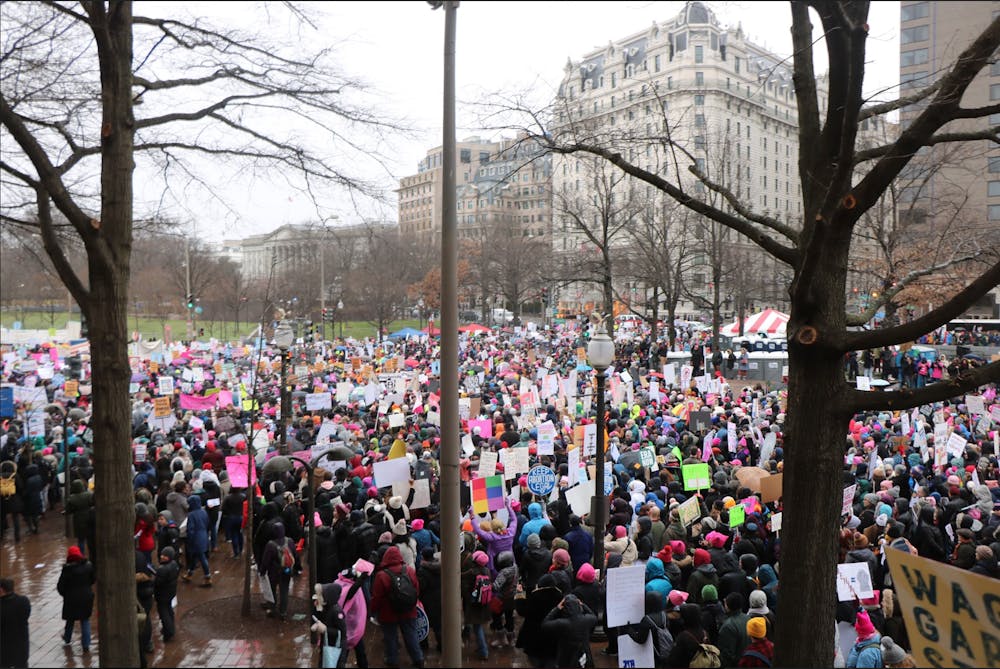Members of the Muslim Student Association and AU College Democrats decided against attending the fourth Women’s March on Jan. 18, citing a lack of inclusivity and intersectionality.
AU students said there were issues of anti-Semitism and diversity, including the ousting of activist Zahra Billoo, all of which were a major factor in their decisions. Billoo was removed from the board of the Women’s March for tweets criticizing the government and military of Israel, the San Francisco Chronicle reported.
Areeba Yasin, MSA’s event coordinator and a sophomore in the College of Arts and Sciences, decided not to attend because of the lack of diversity and inclusion, especially for the women of color who helped found the movement. She also said that when the Women’s March forced out Billoo, a prominent Bay Area Muslim activist and leader whom she knows personally, the organization showed how little it cared for people of color and the Muslim community.
“Even not going is a form of expression,” Yasin said. “I feel like if a group is doing something that's not fully inclusive of everyone, then what are [they] doing?”
Yasin felt as if she’d lost an avenue for expression, one that was especially valuable in the current climate of anti-Muslim sentiment that her community is facing. She quoted a recent tweet from Ilhan Omar, Representative for Minnesota’s 5th Congressional District and one of the first Muslim-American women elected to Congress, to illustrate her feelings on the exclusion she feels from the March.
In a statement released before the March, AU Dems said their decision was driven primarily by the March’s failure to represent “women of color, trans women, queer women [and] women with disabilities,” but said that they hoped members would make their own decisions.
AU Dems President Julia Larkin said that one of her organization’s biggest concerns was the March’s connection to anti-Semitism in recent years. In 2018, the New York Times reported that one of the March’s leaders had ties to Louis Farrakhan, the leader of the Nation of Islam, who has been accused of making multiple anti-Semitic remarks. Farrakhan has denied these charges.
“Given recently what's been happening with the rise in anti-Semitism, especially the attack on Hanukkah in New York and other attacks around the country we just thought… now's not the right time to be complicit in that,” Larkin said.
There’s been a constant disregard for women of color, Larkin said, along with other minority groups, not just in the Women’s March, but also in previous waves of white feminism.
Larkin says that AU Dems is also struggling with representation and has taken steps to address it. These changes include a new caucus system within the group that encourages the expression of intersecting identities, along with a long-term diversity and inclusion plan that will remain a cornerstone document for years to come.
AU Dems’ leadership said that they could see the organization participating in the March in the future if certain changes were made. They hoped for more acknowledgement of intersectionality and inclusion, and especially of the role black women have played in similar marches in the past.
“I think it's kind of hit a point where it didn't feel morally right for us to participate this year,” Larkin said. “If we see things starting to change — [which] I don't think is going to happen within a span of a year — but I think [we could participate] if they start making the right steps and moving in the right direction, you know.”
While Yasin had similar thoughts on future marches, other members of MSA disagreed. When asked what the Women’s March could do to repair its reputation and the rifts it’s created, Nebal Abu Abdo, a graduate student in the School of International Service and member of MSA, simply said “Nothing.”
“This proves again that women of color came to basically unite everyone for these important issues, and yet again they were pushed out,” Abdo said.
Yasin said that these issues with the March are just symptomatic of a larger threat to the Muslim community.
“I don’t want to speak for the entire MSA, but I generally feel there’s a sense of fear,” Yasin said. “We don’t want to step on anyone’s toes because we’re so used to backlash for no good reason. It makes it really hard to have a good sense of community and to properly express ourselves as Muslims.”





